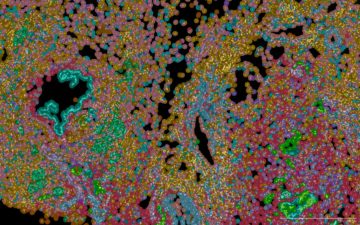Rebecca Roberts in The Scientist:
 DNA mutations in oncogenes and tumor suppressor genes drive tumorigenesis, but epigenetic modifications, such as DNA methylation, take center stage in a new era of cancer research.1 In a study published in Cancer Cell, researchers cast a wide -omics net to capture extensive DNA methylation, transcriptomic, and proteomic data from almost 700 tumors and healthy tissues. 2 Their findings help unravel the complex effects of methylation on tumor development. “This study really provides the first look at how methylation and epigenetic modification of the DNA eventually have an impact on the protein abundance, and that those proteins are actually driving cancers,” said Li Ding, an expert in cancer genomics at Washington University in St. Louis and author of the paper.
DNA mutations in oncogenes and tumor suppressor genes drive tumorigenesis, but epigenetic modifications, such as DNA methylation, take center stage in a new era of cancer research.1 In a study published in Cancer Cell, researchers cast a wide -omics net to capture extensive DNA methylation, transcriptomic, and proteomic data from almost 700 tumors and healthy tissues. 2 Their findings help unravel the complex effects of methylation on tumor development. “This study really provides the first look at how methylation and epigenetic modification of the DNA eventually have an impact on the protein abundance, and that those proteins are actually driving cancers,” said Li Ding, an expert in cancer genomics at Washington University in St. Louis and author of the paper.
Scientists often use proteomics data in a targeted way in cancer research, for example, to detect biomarkers in blood for specific cancer types.3 Ding and her colleagues wanted to perform a much broader study to identify entirely new factors involved in the onset of cancer. It was no small feat. They simultaneously ran DNA methylation, transcriptomic, and proteomic analyses to investigate more than 10,000 genes and proteins across seven different cancer types. This unbiased approach allowed them to discover previously unknown methylation events that affect protein levels and drive cancer.
More here.

 Nonprofit hospitals have been caught doing some surprising things, given how they are supposed to serve the public good in exchange for being exempt from federal, state and local taxes — exemptions that added up to
Nonprofit hospitals have been caught doing some surprising things, given how they are supposed to serve the public good in exchange for being exempt from federal, state and local taxes — exemptions that added up to